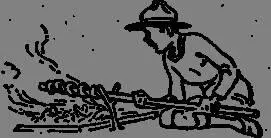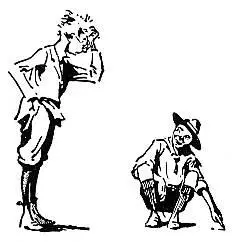Robert Robert - Scouting for Boys
Здесь есть возможность читать онлайн «Robert Robert - Scouting for Boys» весь текст электронной книги совершенно бесплатно (целиком полную версию без сокращений). В некоторых случаях можно слушать аудио, скачать через торрент в формате fb2 и присутствует краткое содержание. Жанр: Старинная литература, und. Описание произведения, (предисловие) а так же отзывы посетителей доступны на портале библиотеки ЛибКат.
- Название:Scouting for Boys
- Автор:
- Жанр:
- Год:неизвестен
- ISBN:нет данных
- Рейтинг книги:3 / 5. Голосов: 1
-
Избранное:Добавить в избранное
- Отзывы:
-
Ваша оценка:
- 60
- 1
- 2
- 3
- 4
- 5
Scouting for Boys: краткое содержание, описание и аннотация
Предлагаем к чтению аннотацию, описание, краткое содержание или предисловие (зависит от того, что написал сам автор книги «Scouting for Boys»). Если вы не нашли необходимую информацию о книге — напишите в комментариях, мы постараемся отыскать её.
Scouting for Boys — читать онлайн бесплатно полную книгу (весь текст) целиком
Ниже представлен текст книги, разбитый по страницам. Система сохранения места последней прочитанной страницы, позволяет с удобством читать онлайн бесплатно книгу «Scouting for Boys», без необходимости каждый раз заново искать на чём Вы остановились. Поставьте закладку, и сможете в любой момент перейти на страницу, на которой закончили чтение.
Интервал:
Закладка:
the mistake again.
Hay-box Cooking
Hay-box cooking is the best way of getting your cooking done in camp, as you only have to start it and the hay-box does the rest. You can then go out and play your camp games with the other fellows, and come back to find that your dinner has cooked itself—that is, if you started it right. If you didn’t— well, you won’t find yourself very popular with the Patrol!
This is how you start it: Get a wooden box. Line it with several thicknesses of newspaper at sides and bottom, then fill it with hay or more newspapers; pack this all tight with a space in the middle for your cooking pot. Plenty of hay below as well as round the pot. Make a cushion packed with hay for the top, or a thick pad of folded newspapers.
Get your stewpot full of food, and as soon as it is well on the boil, pop it into the hay-box. Pack the hay or paper tight round it and over it, put on the covering pad, and jam down the lid with a weight on it.
Meat will take four or five hours to cook in this way. Oatmeal you should boil for five minutes, and leave in bay-box all. night. It will be ready for your early breakfast.
Bread Making
“The three B’s of life in camp are the ability to cook bannocks, beans, and bacon.”
To make bread, or bannocks, or “dampers”, the usual way is to mix flour with a pinch or two of salt and of baking powder, then make a pile of it and scoop out the centre until it forms a cup for the water, which is then poured in. Mix everything well together until it forms a lump of dough. With a little fresh flour sprinkled over the hands to prevent the dough sticking to them, pat it and make it into the shape of a large bun or several smaller buns.
Then put it on a gridiron over hot embers. Or sweep part of the fire to one side, and put the dough on the hot ground left there and pile hot ashes round it and let it bake.
Only small loaves can be made in this way.

Bread can be made without any oven at all. Twist the dough around a stick and bake it over glowing embers.
Pan Bread
Another very good way is the following:
Make a moderately stiff dough with these ingredients: 1 teacupful flour, I pinch salt, 1 tablespoon sugar, 1 teaspoon baking powder. Make a frying pan hot and grease it well, put in the dough and stand it near the fire. In a few moments the dough will rise and stiffen. Then prop the pan up sideways till it is nearly upright on its side in front of the fire, and so cook one side of the flat loaf. Then turn it over and cook the other side. You can see whether it is properly baked by shoving a splinter of wood through it. If the splinter comes out without any dough sticking to it your loaf is baked through.
“Twist”
Still another way is to cut a stout club, sharpen its thin end, peel it, and heat it in the fire. Make a long strip of dough, about two inches wide and half an inch thick (about 5 x 1 cm) and wind it spirally down the club. Plant the club close to the fire and let the dough toast, just giving the club a turn now and then.
Baking Oven
If real bread is required, a kind of oven should be made, either by using an old earthenware pot or a tin box, and putting it into the fire and piling embers all over it. Or make a clay oven, light a fire inside it, and then, when it is well heated, rake out the fire, and put the dough inside, and shut up the entrance tightly till the bread is baked.
Cleanliness
Old Scouts take special care to keep the kitchen particularly clean. They are careful to clean their cooking pots, plates, forks, knives, very thoroughly. They know that if dirt and scraps of food are left about, flies will collect.
Flies are dangerous , because they carry disease germs on their feet, and if they settle on your food they often leave the poison there for you to eat—and then you wonder why you get ill.
For this reason you should be careful to keep your camp kitchen very clean, so that flies won’t come there. All slops and scraps should be burned or thrown into a properly dug hole, where they can be buried, and not scattered all over the place.
Patrol Leaders are responsible for seeing that this is always done. Remember, “A Scout is clean”.
PATROL PRACTICES IN COOKING
Scouts should be able to cook before they go to camp. Teach them the most important things, such as cooking potatoes and porridge, meat and vegetables. These can be practised during the winter.
Practise mixing dough and baking twists and dampers.
Make a hay-box and use it.
Make your own linen ration bags.
Patrols should compete in preparing menus, working out quantities, etc.
Bring raw rations on a hike, make a fire and cook your own meal.
Experiment with different types of fire places until you arrive at the one you think most suitable for your Patrol Cooking. Then try making a number of the kitchen gadgets shown on page 136.
CHAPTER IV
TRACKING
CAMP FIRE YARN NO. 11
OBSERVATION OF “SIGN”
Noticing “Signs” - Details of People - “Signs” Round a
Dead Body - Details in the Country
Use of Eyes, Ears, and Nose by Scouts
Night Scouting

“SIGN” is the word used by Scouts to mean any little details, such as footprints, broken twigs, trampled grass, scraps of food, a drop of blood, a hair, and so on—anything that may help as clues in getting the information they are in search of.
Mrs. Walter Smithson, when travelling in Kas hmir, was following up, with some native Indian trackers, the “pugs” of a panther which had killed and carried off a young buck. He had crossed a wide bare slab of rock which, of course, gave no mark of his soft feet. The tracker went at once to the far side of the rock where it came to a sharp edge. He wetted his finger, and just passed it along the edge till he found a few buck’s hairs sticking to it. This showed him where the panther had passed down off the rock, dragging the buck with him. Those few hairs were what Scouts call “sign”.
Mrs. Smithson’s tracker also found bears by noticing small “signs”. On one occasion he noticed a fresh scratch in the bark of a tree evidently made by a bear’s claw, and on the other he found a single black hair sticking to the bark of a tree, which told him that a bear had rubbed against it.
Noticing “Signs”
One of the most important things that a Scout has to learn, whether he is a war scout or a hunter or peace scout, is to let nothing escape his attention. He must notice small points and signs, and then make out the meaning of them. It takes a good deal of practice before a tenderfoot gets into the habit of really noting everything and letting nothing escape his eye. It can be learnt just as well in a town as in the country.
And in the same way you should notice any strange sound or any peculiar smell and think for yourself what it may mean. Unless you learn to notice “signs” you will have very little of “this and that” to put together, and so you will be of no use as a Scout.
Remember, a Scout always considers it a great disgrace if an outsider discovers a thing before he has seen
it for himself, whether that thing is far away in the distance or close by under his feet.
Читать дальшеИнтервал:
Закладка:
Похожие книги на «Scouting for Boys»
Представляем Вашему вниманию похожие книги на «Scouting for Boys» списком для выбора. Мы отобрали схожую по названию и смыслу литературу в надежде предоставить читателям больше вариантов отыскать новые, интересные, ещё непрочитанные произведения.
Обсуждение, отзывы о книге «Scouting for Boys» и просто собственные мнения читателей. Оставьте ваши комментарии, напишите, что Вы думаете о произведении, его смысле или главных героях. Укажите что конкретно понравилось, а что нет, и почему Вы так считаете.

![Роберт Баден-Пауэлл - Искусство скаута-разведчика[Scouting for boys ; Искусство Разведки для мальчиков]](/books/70572/robert-baden-pauell-iskusstvo-skauta-thumb.webp)









